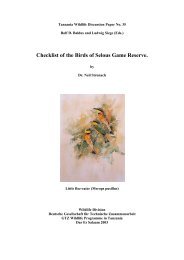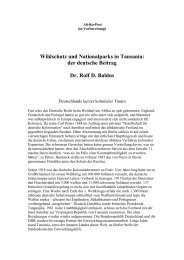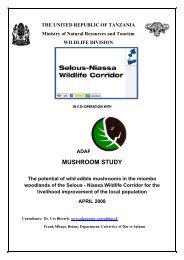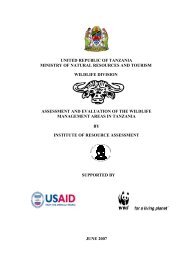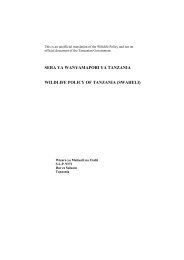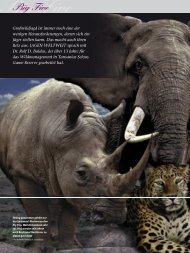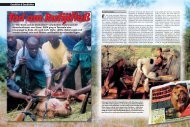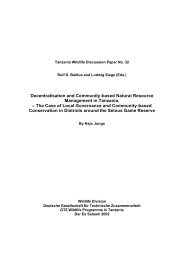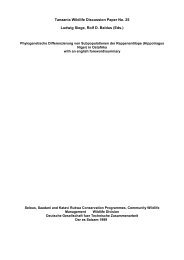encouraged 50 of 80 villages neighboring the Selous Game Reserve to create Wildlife Management Areason their land (Baldus & Cauldwell 2004).Trophy hunting can be done in extremely remote areas and significantly for Africa, is fairly resilient topolitical instability. In the first year of the land grab in Zimbabwe, for example, trophy hunting revenuesdropped by only 12% <strong>com</strong>pared to a 75% fall in ecotourism revenues (Booth 2002). IN CAR during recentyears, trophy hunting has been the only source of revenue from <strong>wildlife</strong> during times of economic crisis, withthe effect that poaching levels are low in hunting concessions and <strong>wildlife</strong> occurs at higher densities than inneighboring national parks (see forth<strong>com</strong>ing article by Lindsey, Roulet & Romañach). In some areas, trophyhunting operators expend considerable effort and resources on anti-poaching. Illegal snaring for bush-meatcan have a devastating impact on <strong>wildlife</strong> populations in a very short space of time. Given the lack ofresources of most state-<strong>wildlife</strong> departments, assistance from hunting operators with anti-poaching can makea huge difference to conservation efforts on the ground. In Savé Valley Conservancy in Zimbabwe, forexample, revenues generated from hunting, enable land owners to deploy at least four times the density ofanti-poaching game scouts as occur in the adjacent Gonarezhou National Park.In several <strong>African</strong> countries, most hunting operators are based in the countries in which they hunt and soleakage of revenues overseas is low. In contrast, many of the ecotourism operators that sell <strong>wildlife</strong> holidaysin Africa are based in Europe or America and a significant proportion of revenues never reach the hostcountries. In Botswana, for example, 75% of hunting revenues remain within the country, <strong>com</strong>pared to only27% of tourism revenues (ULG Northumbrian 2001). Trophy hunting also generates higher revenues perperson than ecotourism, and so environmental impacts from habitat conversion for infrastructure or fossil fueluse for high-volume travel are lower.For a variety of reasons, trophy hunting is very important for <strong>wildlife</strong> conservation in Africa. If trophyhunting were banned, as should happen according to some animal rights groups, then incentives for <strong>wildlife</strong>conservation across vast tracts of Africa would disappear, <strong>wildlife</strong> would be whittled away by (and sufferhugely from) cable snares set for bush meat, and <strong>wildlife</strong> habitat would be degraded by livestock or replacedfor crops.It is thus vital to ensure that hunting continues. However, there is a lot wrong with the trophy huntingindustry in Africa right now and there are many factors that prevent trophy hunting from contributing toconservation in the way that it should. These problems arise from unscrupulous behavior by a minority ofhunting operators, corruption, and due to flaws in the legislative framework governing the industry.Problems associated with hunting fall into three categories: ethical, biological, and social. Ethical problemsassociated with hunting are the most widely publicized, and include the infamous practice of canned lionhunting, shooting from vehicles, hunting predators with dogs, luring predators from protected areas and "putand-take"hunting. Put and take hunting is the dubious practice of releasing trophy animals into a fenced areaimmediately prior to a hunt.Social issues include corruption and unfair distribution of hunting revenues. Corruption affects multiplestages of the hunting industry, from government scouts who overlook the overshooting of quotas, topoliticians favoring certain operators when granting concessions. Distributing hunting revenues fairly isdifficult, and local people who bear the costs of living with <strong>wildlife</strong> are often excluded. Communities do notbenefit adequately from hunting for several reasons including the failure of governments to devolveownership of <strong>wildlife</strong> to local <strong>com</strong>munities, the lack of legislation forcing <strong>com</strong>munity involvement in hunting,pocketing of revenues by local politicians, and a lack of the skills among local people required to for them tobe<strong>com</strong>e more actively involved in the hunting industry.Biological problems associated with trophy hunting are perhaps most damaging for conservation. Most<strong>African</strong> <strong>wildlife</strong> departments lack the resources to conduct accurate game counts, and so quotas are oftenbased on guesswork. Enforcing quotas is difficult across vast, remote hunting concessions and inevitablysome unscrupulous operators overshoot. High profit margins create pressure for increased quota sizes andthe division of hunting blocks, which can jeopardize the sustainability of off-take rates. For some specieseven where quotas seem conservative, the removal of a few individuals can be very damaging. Lions are awell publicized example of this is: male lions often kill cubs when they take over prides whose male has beenkilled by hunters. On game ranches, the value of <strong>wildlife</strong> as trophies means has encouraged (andmaintained) the break up of land into small fenced parcels where predators such as wild dogs and cheetahs92
are considered to <strong>com</strong>pete for potential trophies and are often persecuted. Some ranchers introduce exoticspecies to increase the diversity of trophies available, and others manipulate the genetics of animals to offeraberrant trophies such as white springbok or 'golden' blesbok: practices which contribute nothing toconservation objectives (Hamman et al 2003).So, there is a lot wrong with the trophy hunting industry in Africa at the moment. These problems areincreasingly publicized at a time when there is increasing resistance to the idea of hunting animals for sport,particularly among urban residents of the developed world. Visible action is urgently required from thehunting industry to maximize the conservation role of hunting, and to deal effectively with unscrupulousoperators and unethical hunting practices. In the absence of such efforts, negative publicity surroundinghunting will continue and ultimately foster support for hunting bans.For all the problems associated with the industry, the net impact of trophy hunting for conservation iswithout doubt positive and I believe that removal of revenues from trophy hunting would have catastrophicconsequences for <strong>wildlife</strong> conservation in Africa. Kenya is a case in point. Animal rights activists have playeda big role in promoting continuation of the ban on trophy hunting in Kenya. The hunting ban there makes itextremely difficult to generate incentives for <strong>wildlife</strong> conservation outside of protected areas and is onereason for the negative trends in <strong>wildlife</strong> populations that have been experienced there in recent years (Child2005). Likewise, when hunting was banned in Zambia during 2001-2003, there was an upsurge in poachingdue to the removal of incentives for local people to conserve <strong>wildlife</strong> (Lewis & Jackson 2005).Reducing problems associated with the hunting industry and avoiding future bans is vital. One suggestionto help achieve this is through the introduction of a certification system involving hunting operators (Packer2005). This would involve the rating of hunting operators in terms of their <strong>com</strong>mitment to conservation and<strong>com</strong>munity development by an independent audit team. Research that I did with colleagues during 2005suggested that such a system has the potential to make a difference. We found that hunting clients are more<strong>com</strong>mitted to hunting in a 'conservation-friendly' manner than operators realize. However, at present,inexperienced hunting clients have no way of selecting between reputable and unscrupulous huntingoperators and have a poor understanding of what activities constitute "good" and "bad" practice forconservation in Africa. If "conservation-friendly" operators were awarded a green label, our data suggest thatclients would likely prefer to hunt with such outfits and that they would have a <strong>com</strong>petitive advantage overother operators lacking such certification. In this way, a certification system could create an incentive forhunting operators to hunt in a manner more in line with conservation objectives.Of course, some clients do not care about conservation issues and provide a ready market for unethicalhunts; for this reason, strict regulation of the hunting industry will always be required. The most effective formof regulation would be self-regulation by the hunting industry. For example, unscrupulous operators couldhave trophy entries barred from record books, or be barred from hunting conventions. Effective selfregulationwould go a long way towards making a skeptical audience believe that trophy hunters are seriousabout conservation.Bwabwata Concessions in Namibia Wel<strong>com</strong>e HuntersBy Gerhard R DammIn a historic decision on June 21 st , the representatives of the Kyaramacan Residents’ Trustawarded the two hunting concessions within the Bwabwata National Park to John Wambach of Pro-Guiding (Buffalo Concession in the west) and to Allan Cilliers of Allan Cilliers Hunting Safaris(Kwando Concession in the east) for the 2006 hunting season. This is the story behind the longexpected new concessions:IntroductionFrom the North Eastern corner of Namibia protrudes, appendix-like, the Caprivi Strip; a thin panhandlesome 450km long and with a surface area of 20,000km 2 . It is surrounded by Angola, Zambia, Zimbabwe andBotswana. The Kwando River forms the border between east and west Caprivi, 110 km west of Katima93



